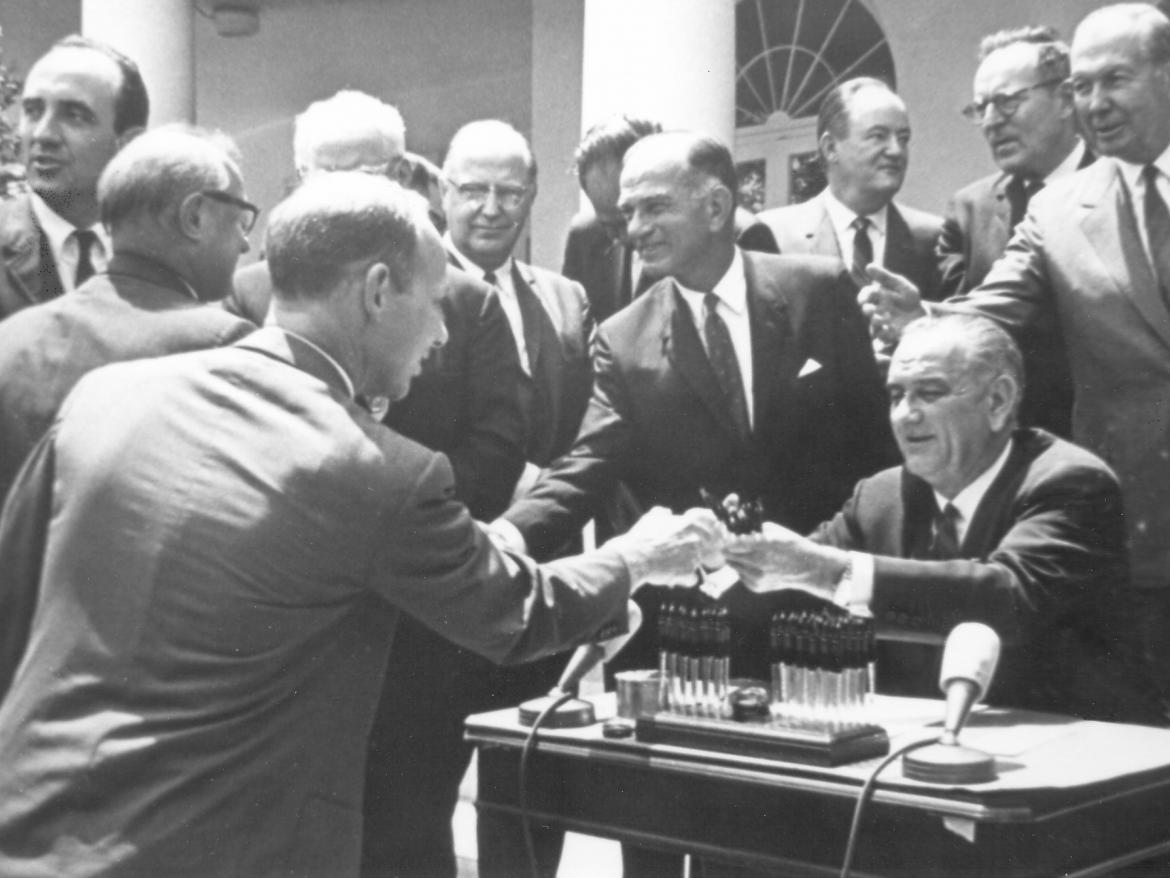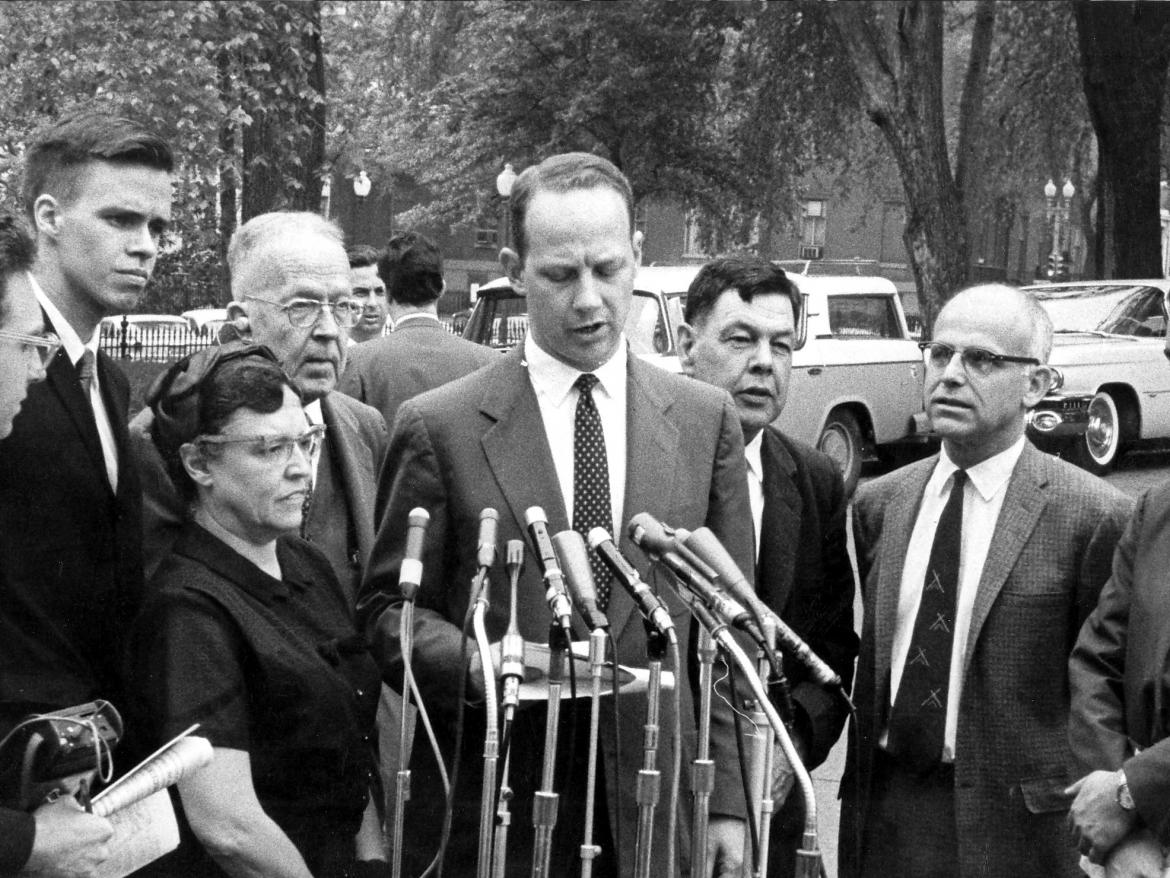Executive Secretary Emeritus Ed Snyder delivered these remarks at the 2015 Annual Meeting on the occasion of his 90th birthday, summarizing nine “trite but true” things he’s learned in the past nine decades.
When I was growing up in Orono, there was a grocery store in nearby Bangor, Maine that called itself Q not Q. — “Quality not Quantity.” I sometimes referred to it when an FCNL meeting had a modest attendance. But as I look out I see Q and Q: Quality and Quantity.
Share your memories of Ed Snyder by emailing them to support@fcnl.org.
Tonight my remarks are “T but T” — Trite but True. I’m not bringing you anything new. You’ve heard it all before. But I’m going to tell you one more time. As they say, those old folks like to repeat themselves. And longevity may have earned us the right to be more dogmatic than diplomatic. So I’m going to tell you my nine trite but true conclusions based on 90 years of living, 35 of them at FCNL. And please forgive my staccato presentation. I want to say a lot in a short time.
Number 1: He who pays the piper calls the tune.
I’ve been singing this song for a long time. Every year in their request for a contribution, Common Cause reminds me that I’ve been a member since 1972, soon after it was launched. At my retirement party I think I dismayed the planners by launching into the evils of too much money in campaign financing instead of humorous anecdotes — this to the assembled members of Congress and guests. We are not going to be successful in our many FCNL priorities until we reform campaign financing and lobbying laws, and have public financing of elections. In Maine last week we successfully voted in a citizen initiative that helped restore the effectiveness of our groundbreaking 1996 clean elections law and also requires disclosure of the biggest campaign contributors. On the positive side, with the acceptance of the Iran deal, we saw that people power can overcome money power.
Number 2: Humility and listening are the best way to learn.
You remember the old saw “It is better to remain silent and be thought a fool than to speak and remove all doubt.” I remember once being approached by an eager young photographer as I crossed the Capitol grounds. He asked me “Are you anybody?” Now that’s a pretty profound philosophical question, but I wasn’t about to deal with it just then. Fortunately, my friend Rep. Bella Abzug was just passing by, so I sicced him on her.
One of my favorite civil liberties quotes is by Judge Learned Hand: “The spirit of liberty is the spirit which is not too sure that it is right.” We desperately need that spirit in Congress and the media right now.
One of the best lessons I ever learned from my predecessor, Raymond Wilson, was to listen carefully to an opposing view and before rebutting, repeat accurately his or her views so they knew that had been accurately heard.
Number 3: Racism is deeply embedded in our national culture.
It was enshrined in our Constitution with the three-fifths compromise. It was the basis of the bloodiest war our nation ever fought. It is currently expressed in our housing, educational, employment, health, and other laws and policies. We are all culturally racist. But, like the alcoholic, I hope we are all recovering racists who attempt to resist temptation when we hear code words and phrases. I have a searing memory of our second black FCNL lobbyist telling me in 1973 that he was resigning after two years at FCNL. We had asked him to speak to Friends Meetings around the country about civil rights legislation in Congress. But he said he couldn’t get to that subject because he had to educate Quakers first on the reality of race in America. We majority whites owe huge compensation to disadvantaged minorities. But I believe it should be paid not to currently living individuals, but by massive changes in our housing, educational, and employment and other race-influenced policies.
Number 4: There is a huge gap between the rich and the poor in our country, and has been since the founding years.
There have been two reform or populist periods in our history. One in the late 19th and early 20th centuries, the other in the 1930s brought on by the Great Depression. But, let’s face it: the gap is now growing tremendously. We actually live in a plutocracy (government by the wealthy) not democracy (government by the people). Can we have a democratic alternative to cutthroat capitalism? I see hope in cooperatives, in so-called B corporations, and in worker-owned corporations.
Number 5: America has a tradition of violence.
It began a long time ago. We live on the land taken from Native Americans. Manifest Destiny took us west to the Philippines and south to the Caribbean. The size of our military establishment dwarfs all others. We have bases throughout the world. Many argue our burden is to be the policeman for the world. Cutting the unaudited Pentagon budget seems impossible. Massacres in our schools, cinemas, and other gathering places has become a ho-hum, “so what else is new” affair, as the gun lobby and the NRA intimidate members of Congress and distort the Second Amendment.
But war is not the answer. We are in a struggle for the soul of America. Peaceful alternatives are available and FCNL has identified them and seeks to fund and implement them. And recently scholars like Erica Chenoweth and Maria Stephan have demonstrated that nonviolent resistance is strategically superior, and, in the end, often leads to much more democratic and stable societies than violent insurgency. Our local Acadia Friends Meeting gives a Peace Award of $500 to a high school senior every year who models nonviolence — along with a year subscription to Yes! magazine. It tells about all the positive happenings every day in our country. I hope many of you subscribe to Yes! magazine.
Number 6: Fear is a great motivator, but hope is essential to bring right action.
We are all heirs to our primitive fight or flight past. So when we perceive danger, our instinct is to act — even if the danger may not be real. Right now we humans face a number of very real dangers, including nuclear weapons and nuclear war and climate change. But real dangers must be met by realistic actions, otherwise people end up being paralyzed or feeling helpless. I see identification of positive alternatives as a major role for FCNL in Washington.
Hope helps us persevere in hard times. We believe there is that of God in everyone. So we must treat all with civility and respect. Paul’s advice to the Philippians is difficult, but profound “Whatsoever things are true…beautiful…and of good report, think on these things….” Or, more colloquially, “Courtesy is Contagious” and “You’ve got to accentuate the positive, eliminate the negative and don’t mess with Mr In Between.”
Number 7: We are not alone.
There are many like minded, well motivated people all over the country — in your hometown, on Capitol Hill, in the executive branch, and in all sorts of organizations. One of the most important roles FCNL has in Washington is our leadership in forming and sustaining coalitions. FCNL is looked to by many to lead on many of our priority issues.
Number 8: Young people are the hope of the world.
They are not circumscribed by the world we oldsters grew up in. FCNL’s interns, legislative assistants, and young fellows bring new energy, insights, and support. They have been a blessing to the rest of the staff. It’s their world and we older generations need to get out of the way and let them take the lead in building it.
Number 9: FCNL has a roadmap to the future.
It’s called The World We Seek: The Statement of Legislative Policy. Every few years we refine and update it. If you haven’t read it cover to cover recently, I recommend it. That exercise will lift your spirits, give you hope, and energize you to action.
So let me summarize:
- We desperately need campaign reform and public financing of elections.
- Humility and listening are the best way to learn.
- Like the alcoholic, we can all try to be recovering racists, and support massive changes in our housing, education, and employment practices.
- I see hope for a democratic economic system in cooperatives, in B corporations, and in worker-owned corporations.
- War is not the answer; nonviolent alternatives are strategically superior.
- Fear can paralyze. The best remedy is relevant action buoyed by hope.
- We are not alone. We have many allies.
- Young people are the hope of the world.
- The FCNL Policy Statement provides an inspired roadmap to a sustainable future.


